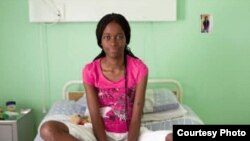The lengthy and painful treatment for multi-drug resistant tuberculosis (MDR-TB) is one of the health topics to be discussed as leaders in world health at the 2014 World Health Assembly in Geneva.
As health ministers search for a revolutionary approach to the control, prevention of tuberculosis (TB) and the care of its victims, they will discuss a new 20-year strategy for the treatment of people who suffer from the extensively drug resistant tuberculosis (XDR-TB).
This week’s gathering of health ministers comes at a crucial moment for the more difficult-to-treat XDR-TB, says Doctors Without Borders – also called MSF.
Another significant highlight of the assembly is the delivery of over 33,000 signatures by South African TB activist and XDR-TB survivor Phumeza Tisile. The petition called the 'DR-TB Manifesto,' urges world health leaders to focus on better drugs and diagnostics that thousands of XDR-TB patients need worldwide.
MSF’s medical coordinator for South Africa and Lesotho, Dr. Gilles van Cutsem, says the petition has a dramatic purpose.
“First of all, it is being handed over by Phumeza Tisile, who exemplifies how difficult it is to survive treatment for drug resistant TB, and to take treatment for drug resistant TB,” says Cutsem.
“She took more than three years of treatment, more than 20,000 tablets, more than one and one-half years of very painful injections which made her deaf, because that’s one of the side effects of the treatment of multi-drug resistant TB,” the MSF medical coordinator says.
Tisile came to the Geneva meetings this week because she wants to urge the health ministers to make the treatment accessible, says Cutsem.
"Today, out of 650,000 people, with drug resistant TB, only 80,000 are being treated,” says the South Africa medical coordinator.
He says she is also asking leaders to make the treatment better, meaning make the treatment time shorter, with less side-effects, and without injections.
In addition, Tisile is calling for funding to research better treatment options for drug-resistant TB.
“Treatment for TB, whether it’s multi-drug resistant TB or drug sensitive TB, most of the drugs are extremely old - date from the sixties. Now, Phumeza accessed through Doctors Without Borders some newer drugs such as linezolid, which are extremely expensive in South Africa at the moment because of patents,” van Cutsem says.
He said it is important that world leaders address the issues regarding drug-resistant TB such as prevention, access to treatment, and research for improved drugs. Drug-resistant tuberculosis is expanding across the globe, says van Cutsem, but the pharmaceutical response is vastly insufficient.
“We have bad drugs, says Dr. Cutsem. “We have insufficient research into making the drugs better and making a regimen shorter, and easier to take, and we don’t have very good programs to detect people with drug-resistant TB,” he says.
As health ministers search for a revolutionary approach to the control, prevention of tuberculosis (TB) and the care of its victims, they will discuss a new 20-year strategy for the treatment of people who suffer from the extensively drug resistant tuberculosis (XDR-TB).
This week’s gathering of health ministers comes at a crucial moment for the more difficult-to-treat XDR-TB, says Doctors Without Borders – also called MSF.
Another significant highlight of the assembly is the delivery of over 33,000 signatures by South African TB activist and XDR-TB survivor Phumeza Tisile. The petition called the 'DR-TB Manifesto,' urges world health leaders to focus on better drugs and diagnostics that thousands of XDR-TB patients need worldwide.
MSF’s medical coordinator for South Africa and Lesotho, Dr. Gilles van Cutsem, says the petition has a dramatic purpose.
“First of all, it is being handed over by Phumeza Tisile, who exemplifies how difficult it is to survive treatment for drug resistant TB, and to take treatment for drug resistant TB,” says Cutsem.
“She took more than three years of treatment, more than 20,000 tablets, more than one and one-half years of very painful injections which made her deaf, because that’s one of the side effects of the treatment of multi-drug resistant TB,” the MSF medical coordinator says.
Tisile came to the Geneva meetings this week because she wants to urge the health ministers to make the treatment accessible, says Cutsem.
"Today, out of 650,000 people, with drug resistant TB, only 80,000 are being treated,” says the South Africa medical coordinator.
He says she is also asking leaders to make the treatment better, meaning make the treatment time shorter, with less side-effects, and without injections.
In addition, Tisile is calling for funding to research better treatment options for drug-resistant TB.
“Treatment for TB, whether it’s multi-drug resistant TB or drug sensitive TB, most of the drugs are extremely old - date from the sixties. Now, Phumeza accessed through Doctors Without Borders some newer drugs such as linezolid, which are extremely expensive in South Africa at the moment because of patents,” van Cutsem says.
He said it is important that world leaders address the issues regarding drug-resistant TB such as prevention, access to treatment, and research for improved drugs. Drug-resistant tuberculosis is expanding across the globe, says van Cutsem, but the pharmaceutical response is vastly insufficient.
“We have bad drugs, says Dr. Cutsem. “We have insufficient research into making the drugs better and making a regimen shorter, and easier to take, and we don’t have very good programs to detect people with drug-resistant TB,” he says.












